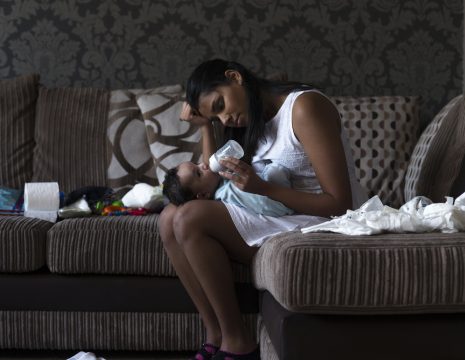Morning sickness and mental health: three women’s stories
Morning sickness affects 70%-80% of pregnant women and, despite its name, isn’t limited to the morning. For most women, the symptoms improve after the first few weeks of pregnancy. But in some cases, symptoms can persist for most or all of the pregnancy. More severe cases of morning sickness are called hyperemesis gravidarum.
Morning sickness is much more than an inconvenience, it can cause severe distress to women, and can also be worrying for their partners and families. Last year, following reports that Kate Middleton suffered severe morning sickness, iNews highlighted the fact that MG can affect women’s mental health for years. Here we look at three women’s stories, which outline the impact that hyperemesis gravidarum can have on mental and physical health.
Rachel Platten: “I was so afraid I would seem ungrateful”
Singer Rachel Platten – best known for her 2015 hit single Fight Song – has this month announced she is several months pregnant. She is thrilled about the prospect of motherhood, but has suffered from severe morning sickness. She admits, via a post on her Instagram page that pressure to present the ‘perfect’ pregnancy has made her reluctant to talk about it. “The truth is,” she said, “I’m overwhelmed with love, joy and happiness about our baby. It’s a total miracle that I’m growing a human and my husband and I couldn’t be more thrilled. But, I have also had an incredibly difficult spring and summer with serious nausea, exhaustion, sickness and all the other symptoms no one wants to really talk about”.
She added that she feared coming across as negative if she talked about the problems she was having. “I was so afraid that if I shared that part (the difficulty flying and performing while puking in green rooms and airplanes) that I’d seem ungrateful somehow”.
For couples struggling to conceive, and those who have suffered miscarriage, hearing about the difficulties of pregnancy can be painful. But equally, a recent survey by the University of Illinois found that 46% of women had been exposed to unrealistic messages around motherhood in the media. So Rachel’s candour about her struggles with morning sickness could help other mums-to-be who are having a less than rosy experience.
Joshna Mavji: “I can’t continue with the pregnancy”
According to an article by the BBC, Joshna and her husband Sanjay had been trying to conceive for some time. After IVF, the couple got the news they’d been dreaming of – Joshna was pregnant. It felt like a miracle. But the joy soon turned to despair when she started to suffer from severe morning sickness. “I was sick constantly, in and out of hospital. It was physically and mentally draining”, she says.
Because she’d wanted so badly to get pregnant, Joshna felt even more pressure to have the perfect pregnancy. So when hyperemesis gravidarum started to take its toll – mentally and physically – she feared it was a “bad sign”. She felt like something was trying to tell her the pregnancy was “not meant to be”, and she told her consultant she couldn’t continue with the pregnancy.
The consultant was surprised that she had reached this point given how desperate she had been to conceive. This, she says, made her feel “pathetic and stupid”. Luckily, her GP was able to refer her to the mental health crisis team who prescribed her a course of treatment.
After the birth, she experienced panic attacks and depression. Her baby yoga teacher put her in touch with Acacia Family Support, a Birmingham-based charity supporting those with perinatal health problems. “It was my life-saver”, she says.
Joshna’s story highlights the very real psychological impact of severe morning sickness. It also highlights the fact that resulting depression can be accompanied by feelings of guilt. Like Rachel Platten, Joshna feared she was somehow unjustified in feeling this way. “I felt like people would look at me and say, why should you be feeling like this? You have everything: friends, a supportive family, a home, you have a good job, you’re not a single mum, you have no reason to get ill.”
Kirstie Clark: “My sister didn’t smile in 10 months”
Kirstie is a photographer from Dallas, Texas, who specialises in photographing births. And no project was closer to her heart than that of photographing her sister giving birth. The event was particularly emotional given what her sister had been through over the nine months of her pregnancy. Kirstie’s sister’s morning sickness was so bad that she lost 30lb during the pregnancy. She ended up in hospital four times, dehydrated and malnourished.
“I watched her go through hell. She was in constant pain. She could have died carrying her baby”, Kirstie told Bored Panda. One of the most moving moments captured during the birth was when the baby’s father burst into tears at the sight of his wife smiling. It was the first time she had smiled in 10 months.
Kirstie loves babies, but the main objective of her work is to normalise birth and the traumatic experiences women go through. She added: “The goal…is to encourage women and let them see different options of births and experiences. To let them know that they are valid and that their experiences are not simply equated to ‘well at least you’re ok.’”
Getting help with morning sickness
If you’re struggling with morning sickness, speak to your GP or midwife. While morning sickness can be difficult to treat, there are options for easing the symptoms. Additionally, if you’re feeling depressed or anxious as a result, it’s important to get support. The NHS website offers information and signposting to local services. The charity Pregnancy Sickness Support can also provide help and information.
My Possible Self is a digital mental health toolkit, available as an app or via desktop. It uses content that’s proven to reduce stress, anxiety and mild to moderate depression in eight weeks. New parents may benefit from our module Managing Stress and Overload. Our module on Managing Fear and Anxiety is free to use. Download the app now or visit our website to find out more.

